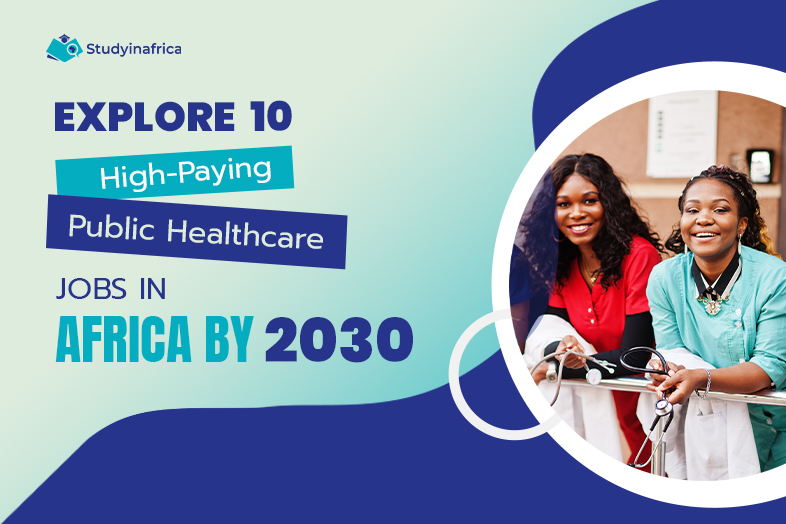
Blog Summary
Infectious diseases remain a pressing concern across Africa, impacting health systems, economies, and communities. Diseases like malaria, tuberculosis, HIV/AIDS, and COVID-19 emphasize the need for comprehensive public health systems and proactive, research-driven solutions. With the right training, public health professionals can address these health crises effectively. This is where a PhD in Public Health becomes a critical tool—equipping individuals with the expertise and skills necessary to design impactful health solutions and policies that target disease control and prevention.
In this article, we’ll explore how advanced education, particularly a PhD in Public Health, empowers individuals to make a difference in combating infectious diseases in Africa, detailing how this degree can shape a career that actively impacts health systems.
- Why a PhD in Public Health Is Vital for Tackling Infectious Diseases in Africa
- Career Opportunities for PhD Graduates in Public Health
- Educational Pathways: Pursuing a PhD in Public Health in Africa
- How Universities in Botswana Contribute to Infectious Disease Research
- Getting Started: Pursuing a PhD in Public Health in Botswana
- Infectious Diseases and Public Health Impact in Africa
- Conclusion
Why a PhD in Public Health Is Vital for Tackling Infectious Diseases in Africa
Addressing the health challenges in many parts of the world is a formidable task, especially in areas with limited resources, infrastructure constraints, and shortages of healthcare professionals. While frontline health workers are crucial, there’s also a pressing need for researchers and policy experts who can design and implement impactful health programs. Pursuing a PhD in Public Health offers specialized training in areas such as epidemiology, health policy, and community engagement—all vital to tackling these issues effectively.
A PhD in Public Health equips students with advanced research methodologies and the skills needed to influence policy-making. Graduates are well-prepared to lead initiatives that promote disease prevention, improve health systems, and drive meaningful change in communities facing complex health challenges.
Core Areas of Study in a PhD in Public Health for Addressing Health Challenges
1. Epidemiology and Disease Surveillance:
Understanding disease trends is essential for intervention. PhD students specializing in epidemiology learn to study disease patterns, analyze risk factors, and create models to forecast outbreaks. These skills allow them to design preventive measures and targeted solutions.
2. Health Policy and Program Design:
PhD students in public health often focus on policy development, learning how to influence decisions that shape healthcare infrastructure. Policies formulated by public health experts can make a significant impact on managing and preventing disease outbreaks. PhD holders often work in government agencies, NGOs, and international organizations, influencing strategies that strengthen healthcare systems.
3. Community Health Education:
A PhD in Public Health emphasizes health education, equipping graduates to drive awareness campaigns on disease prevention. With this expertise, they can work on initiatives that educate communities, promoting health practices that reduce infection risks.
4. Securing Funding and Resource Allocation:
Many regions in Africa lack sufficient funding for healthcare initiatives. PhD graduates with a focus on public health can contribute by securing grants and other resources that support infectious disease control programs, ensuring health projects have the resources they need.
Career Opportunities for PhD Graduates in Public Health
Pursuing a PhD in Public Health opens a range of impactful career paths, especially for those driven to combat infectious diseases:
- Research Scientists and Epidemiologists: These experts work on discovering new insights into disease prevention and control, contributing valuable knowledge to institutions and organizations.
- Public Health Policy Advisors: Graduates can work with government bodies or NGOs, formulating policies and programs to control the spread of infectious diseases. Their expertise is essential for developing effective public health frameworks.
- University Professors and Educators: Training the next generation of public health professionals is critical to sustaining healthcare improvements. Professors in public health teach and conduct research that informs public health strategies.
- Program Directors and NGO Leaders: Many NGOs focus on disease reduction in Africa. PhD holders often lead these organizations, coordinating health programs and ensuring they reach those in need.
- International Consultants and Advisors: Organizations such as WHO, UNICEF, and the CDC regularly collaborate with public health experts to create effective disease control programs. Through their consultation, these experts offer essential insights that help design strategies to tackle health challenges, improve outcomes, and address pressing issues in underserved regions. Their expertise shapes impactful interventions that strengthen global health initiatives and advance public well-being.
In Botswana, for instance, public health jobs offer extensive opportunities for PhD graduates to impact healthcare policies and initiatives. With relevant expertise, these professionals are eligible for positions that provide a strong public health salary in Botswana, particularly in roles related to health policy and program development.
Educational Pathways: Pursuing a PhD in Public Health in Africa
1. Distance Learning Options
With the rise of distance learning courses in Botswana and other African countries, pursuing a PhD in Public Health has become more accessible. Distance learning options allow students to balance work, research, and studies while actively contributing to healthcare initiatives in their communities.
2. Program Duration and Structure
The PhD in Public Health duration typically ranges from three to five years, depending on whether students study part-time or full-time. Programs usually include coursework, research, and dissertation projects, covering a comprehensive set of public health topics relevant to addressing infectious diseases.
3. Eligibility and Admission Requirements
Requirements for a PhD in Public Health can vary, but applicants typically need a master’s degree in a related field, relevant research experience, and a strong research proposal. Many programs prioritize applicants who show a dedication to public health challenges, particularly infectious diseases.
Botswana offers various accredited universities where students can pursue their studies. Universities in Botswana offer PhD programs in public health, making it a valuable destination for students who want to study relevant health issues close to home.
How Universities in Botswana Contribute to Infectious Disease Research
African universities, particularly universities in Botswana, play a crucial role in developing solutions for infectious diseases. Through research and community engagement, these institutions focus on disease prevention methods and health strategies that are specific to the African context.
For instance, degree courses in Botswana emphasize real-world applications, equipping students to tackle local health challenges. Top universities in Botswana foster collaboration with international organizations, allowing students to gain a broader perspective on global health solutions.
Getting Started: Pursuing a PhD in Public Health in Botswana
For those aiming to combat infectious diseases, public health PhD programs in Botswana provide a combination of academic rigor and hands-on experience. Applicants can research the phd in public health eligibility requirements for each institution to ensure they meet the criteria. With the opportunity to study in Botswana, students receive hands-on experience and gain insight into the challenges faced by communities throughout the region.
Infectious Diseases and Public Health Impact in Africa
Infectious diseases account for approximately 69% of total disability-adjusted life years (DALYs) lost in sub-Saharan Africa, according to the World Health Organization (WHO). Additionally, diseases such as malaria, HIV/AIDS, and tuberculosis collectively contribute to over 3 million deaths annually in the region. Public health interventions have proven effective; for example, malaria-related deaths have decreased by 44% since 2000 due to coordinated public health campaigns and research-driven strategies.
Conclusion
The fight against infectious diseases in Africa calls for innovative, research-based approaches. A PhD in Public Health equips students with the skills needed to conduct impactful research, influence health policies, and lead educational initiatives that can transform communities. By pursuing advanced studies, public health professionals become leaders in the field, addressing one of Africa’s most pressing health issues with a commitment to lasting change. For aspiring health professionals, higher education in Botswana and other African nations offers valuable opportunities to gain the knowledge and skills needed to make a difference.



